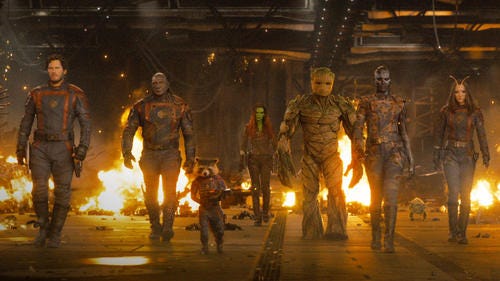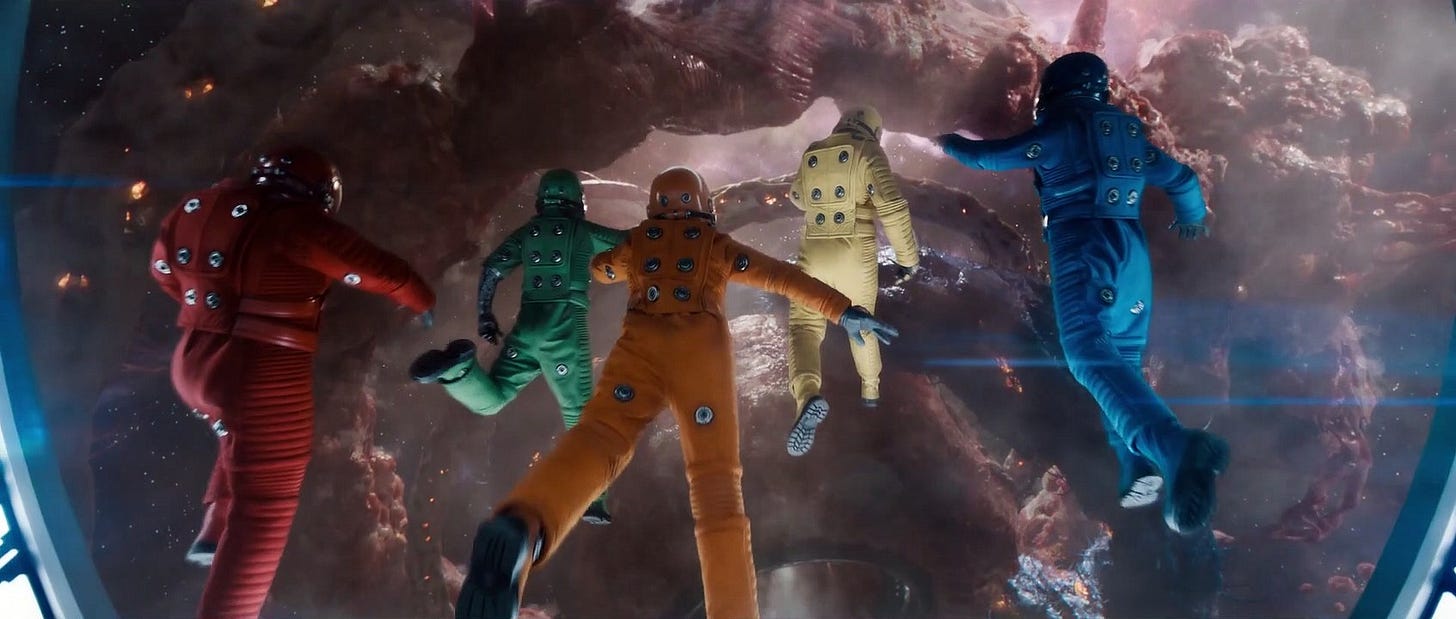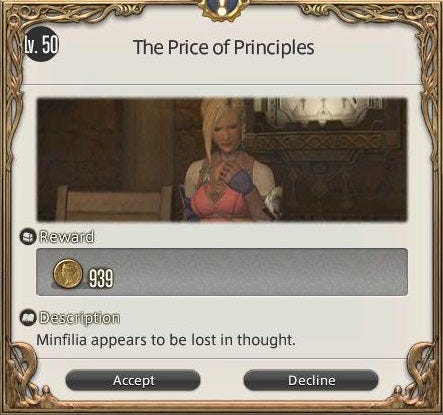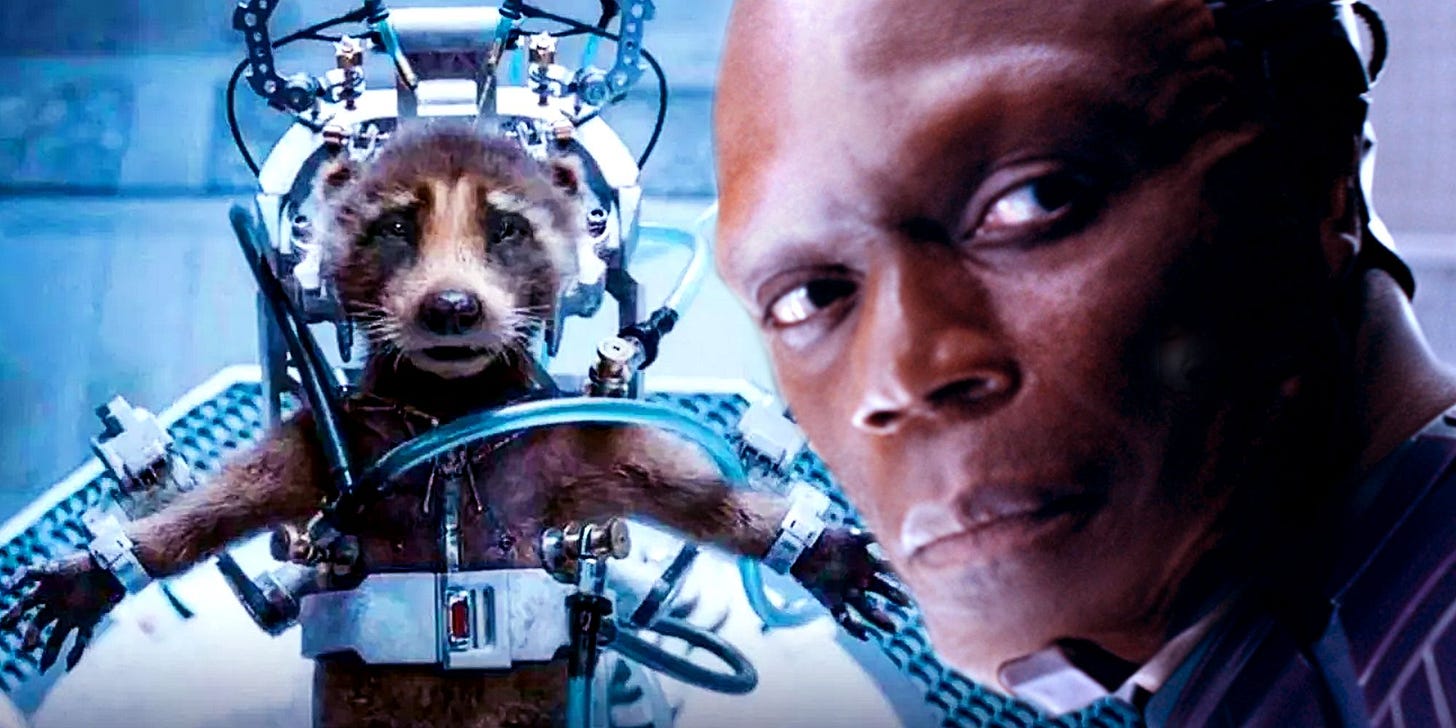Movie Review: Guardians of the Galaxy Vol. 3
The Guardians go out Gunn's a-blazin'! But there is much more to this film than meets the eye. Get ready for a deep dive and a very unconventional review.
To celebrate Guardians of the Galaxy 3 finally hitting Disney+ today, I have to decided to equally finally release my long-awaited review of the film. One upside of this review growing far more expansive than I had ever imagined is that it gave me time to come down from the post-theater high, and that was good because what I’m about to say may shock you. It shocked me.
Guardian of the Galaxy Vol. 3 is a perfect film.
There. I said it. Now, let’s clarify terms. For me, a perfect film in context here is one that brilliantly accomplishes everything it sets out to do. It does not have to be the most profound or the most artistic film. It does not have to break new cinematic ground. It doesn’t need to be Citizen Kane or Seven Samurai or La Dolce Vita; it just needs to know what it wants to do, and then execute that flawlessly. As I wisely have written above the entrance to my Oracle at Delphi: “Know thyself.” This may sound simple enough to accomplish, but the reality is the vast majority of films (and people, for that matter) fail miserably at this task.
Some recent examples of “perfect” films in this vein would be Snatch and Top Gun Maverick. From casting to scoring to shot selection—in both style and substance—they know what they want to accomplish, they know what their audience wants, and by God they deliver. Not a scene or line of dialogue is askew. And now we can add Guardian of the Galaxy Vol. 3 (GotG 3 for short) to that list.
I should also note that I hated most of the recent Phase 4 MCU projects. I am a lifelong fan of Marvel comics, and I loved seeing my childhood heroes, like Captain America, brought to the big screen, along with one of my favorite stories in The Infinity Gauntlet. Growing up with Dolph Lundgren Punisher and Jessica Alba Fantastic Four, I had all but given up hope on getting a decent comic film. That all changed with the seminal masterpiece Blade (still the best comic film of all time), but even that trilogy had immolated like a noontime vampire by its final installment, with poodle-clad Triple H battling Ryan Reynolds as I vomited popcorn in confused despair. So, I will always cherish the good times Marvel films gave me up to and including Infinity War and that roster of Phase 3 films.
Recently, Disney Marvel—which had certainly had its toes in the Woke pool for quite a while—decided to cannonball into the deep end. This, combined with expiring contracts and risibly incompetent leadership, meant that we said goodbye to iconic characters and classic, mythic storylines. In their place, we were now greeted with obnoxious, new, C-tier, identity checkbox champions, palette swaps of recently retired legends, and asinine stories that ranged from regurgitated Woke narratives to AI-created garbage about AI-created garbage. To paraphrase Don McLean: the music had died.
Or so it seemed.
You see, in that sad silence that fills an empty auditorium like paper cups and candy wrappers, something strange happened. The nostalgic sound of a cassette mixtape being slapped into a boombox and the satisfying “thunk” of the play button being pressed could be heard from just out of sight. Suddenly, the dirgeful chords of Radiohead’s Creep could be heard wafting toward you. It was a bittersweet symphony, to be sure, but it was beautifully constructed. It remined you of good times. And it was catchy.
As you track the source of the sound and subconsciously tap its rhythm with your toes, you see a familiar group of friends sitting in the corner with that boombox. It’s James Gunn and the Guardians of the Galaxy, and you know in that moment that the music is back.
GotG 3 is fun. Damn fun. Refreshingly fun.
Most of today’s comic filmmakers seem mortified at the notion of a fun film. After all, pushing The Woke Narrative is serious business! Lately, we’ve been cudgeled with movies where mopey Batman spends his dark nights getting lectured about white privilege, “The Black Falcon” dourly recites Woke platitudes at a guy with a robo-arm struggling with his past atrocities as a brainwashed assassin1, and Captain Marvel frowns at us from one feminist fever-dream scene to the next. Yet, for all of their pretentious posturing, these films are just puerile paint-by-number plots with the same shallow characters.
By contrast, GotG 3 feels fresh and imaginative, like fantasy and sci-fi used to. For example, when the Guardians land their latest ship, The Benatar, in the middle of the sunny, suburban furry-topia of High Evolutionary’s Counter-Earth, the sprawl of pastel paneling and manicured lawns feels molded from the same uncanny plastic perfection as the neighborhoods of Edward Scissorhands or A Wrinkle in Time. And when the gang embarks on their mission to infiltrate the OrgoCorp facility, we are treated to a tense, action-packed romp across a giant, bio-organic space station replete with puffy-suited security details patrolling capacious, boldly colored, hi-tech lobbies. GotG 3 reminded me more of the vivid visuals of the brilliant Besson cult-classic The Fifth Element than the recent deluge of unimaginative, modern Star Wars copy-pastas.
And these delightful designs serve as the perfect backdrops for the characters to really shine. Which brings us to our next point…
GotG 3 is funny. Damn funny. Refreshingly funny.
Over the years, James Gunn’s trademark snarky banter has been hit-or-miss for me. Frankly, more often missing in the past. However, in GotG 3 it drills the bullseye like Robin Hood on stilts.
Why? It is because that style of witty repartee requires interesting, unique, well developed characters that the viewer has grown to understand. That takes time, and—despite Disney’s and (Right-Wing?) Cancel Culture’s attempt to derail both Gunn’s career and his Guardians’ story—Gunn has finally been able return to the quirky characters he cultivated and capitalize on the time he and the audience have spent getting to know them.
One of the chief ways in which GotG 3 excels in developing its eclectic cast even while the plot races along at breakneck speed is something I call: “The Square Principle.” (I confess that this is one of my favorite inventions, along with my alliterative “Mr. Miyagi Maxim of Modern Marketing.”)
I named The Square Principle after the Japanese video game company Square (now Square-Enix after their 2003 merger). Square is mainly known for their epic role-playing games, most notably the Final Fantasy series. I contend that in the 90s, Square had the single best decade of any video game developer in history, but that’s a story for a different day. What is important here is why they were able to accomplish this. They were doing a lot of things right during this era, but their writers practiced a particular principle that allowed players to stay engaged with their vast casts over the course of their sprawling narratives.
The Square Principle is this: when writing a story following the exploits of a group of characters, make sure that all of them get at least one significant event to highlight their character. That’s it. That’s the principle. This may sound simple enough to accomplish, but the reality is the vast majority of films (and games) fail miserably at this task (déjà vu!). They will either lose focus and bog down their stories by expanding too much on too many characters, or they will neglect some characters altogether, disappointing fans and making the work feel incomplete. And after all, everyone is the hero of their own story, aren’t they?
I used the phrase “a group of characters” advisedly. In Japanese role-playing games (JRPGs for short), you often oversee (or “play the role of,” to coin a phrase) a diverse party made up of multiple adventurers. For this reason, many JRPGs do not technically only follow a protagonist, as that entails a single main character. However, they are not truly ensemble casts either, in that the principal characters are not assigned “roughly equal amounts of importance and screen time.” Instead, they generally have one or two characters in your party who are featured, enjoying a bulk of the importance and screen time, and then several supporting party members, who contribute in various ways, but who are assigned less overall importance and screen time. As I can’t find a good term for this approach—and you know I am solutions-oriented—I will create a term. I dub this… “Differential Protagonism!” Ehhhh, pretty cool, right? No!? Oh well, I tried didn’t I? At least I did that.
Square mastered this approach in the 90s. No matter how crazy their rosters became, and how compelling the main protagonist’s quest, they would always include events that allowed for the supporting cast to shine, whether it be showcasing their special skills, resolving past traumas, or evolving as a result of their experiences. As these were video games, you usually got a cool new ability or weapon for your troubles as well. Sweet.
Examples of The Square Principle of Differential Protagonism (You’re warming up to the term, I just know it!) can of course be found all over literature and cinema as well. Harry Potter gets more time than Ronnie the Bear, but Ronnie rocks it in that chess game! Aragorn gets more time than Gimli, but Gimli still… um… OK, Gimli just sucks, but you see what I’m getting at here.
And that brings us all the way back to GotG 3. This film also has Differential Protagonism, i.e., Gunn makes clear that the story has been about his beloved Rocket Racoon all along. As a result, even with Rocket spending most of the film unconscious, he gets the lion’s (racoon’s?) share of screen time via flashbacks before his eventual climactic return. However, Gunn acknowledges that the resolution of Pete and Gamora’s star-crossed romance puts those characters in a tier just below Rocket. Pete and Gamora share the second-place spot throughout the film. And, importantly, the rest of the party still gets at least one showcase scene.
Mantis uses her superhuman empath powers to calm the monstrous Abilisks and save her friends from certain doom.
Drax uses his uniquely childlike nature to communicate and coordinate with captive kids on the High Evolutionary’s ship.
Kraglin communes with the spirit of Yondu to unlock the power of the deadly yaka arrow and defend Nowhere from invading creatures.
Cosmo bravely defends Kraglin against one of those creatures, using telepathy to crush it between two slabs of concrete, and earning praise as the “good dog” that she is.
All of this culminates in the brilliant, single-shot, corridor fight sequence toward the end of the film. This shot is The Square Principle epitomized, with each character getting a chance to shine using their own distinct fighting style as the Guardians slice, blast, and groot through a hallway full of menacing mutants. It is a glorious sight to behold and the culmination of Gunn’s work meticulously crafting these characters.
GotG 3 is religious. Damn religious. Refreshingly religious.
There certainly was a time when Hollywood colluded to push Conservative, Christian mores on audiences with one hand while locking those pesky gays and lefties in the closet with the other. That was bad. That time is also not now.
Now, Hollywood colludes to foist its new religion, Liberal Wokeness, on audiences and won’t nominate you for an Oscar unless at least half of your cast and crew are gay, black, midget trannies who will swear on Das Kapital an oath to the CCP to defund the police, support the FBI, TrUSt dA SCiENcE™, and fight da climate change… from their private jets, of course. That is also bad.
Case in point: the industry’s enmity for Sound of Freedom. I am not even religious in a conventional sense, but when your hatred of Conservatism and Christianity reaches such a frenzied pitch that you find yourself rushing to bash a film about exposing child trafficking and rescuing kids from a lifetime of brutal rape… well, it may be time to reassess your priorities.
Case in point: the industry’s infatuation with Barbie. A film deceptively marketed to unsuspecting moms and their young daughters that is actually yet another feminist fever dream that follows the textbook subversion playbook of kidnapping a beloved, anodyne cultural icon, gutting it, and then parading around in its skin while spouting off Party propaganda that unsuspecting audiences will uncritically accept because it is pouring forth from a friendly, familiar face. It is worth noting that the Woke Authoritarians have reached such a level of power, prevalence, and arrogance that—aside from that initial marketing blitz—they aren’t even hiding the ball anymore; they brag about doing exactly what I just described!
It is against that backdrop that GotG 3 (like Top Gun Maverick) is a damn near revolutionary film in its brazen disregard for ruling class’s Woke Narrative.
It is also against this backdrop the GotG 3 is a masterclass in how to convey themes of faith and friendship in a manner that eschews the heavy-handed, self-serious, preachy and puritanical tone of the mid-century, “McCarthyism & Hays Code” American cinema I referenced earlier. It also manages to avoid the tropes of the current, Hallmark channel, religious cringe media where Jesus helps some modern-day June Cleaver get the cookies baked in time for company. It’s another miracle!
GotG 3 manages to walk a damn near impossible line, and does so with the poise, grace, and confidence of a Cicue du Soleil acrobat.
How, exactly, does it do this? Well, I am glad you asked!
The first way Gunn weaves religious overtones into his magnum opus is visual. The best example of this is the scene where Star-Lord yippie ki-yays from the High Evo’s exploding spaceship only to be caught in the frozen vacuum of space. All hope seems lost until we see an outstretched hand reaching toward the seemingly doomed hero—resurrecting him like a phoenix against a backdrop of primal, cosmic flame—recalling not only Peter’s similar rescue of Gamora in the first GotG, but also Michelangelo’s famed fresco The Creation of Man, featuring another famous Adam, which adorns the ceiling of the Sistine Chapel.
The brilliance of this shot selection is more than just celluloid deep though. The character choice is no coincidence; it is a nod to Adam Warlock’s reputation in Marvel Comics (especially once Starlin and Thomas got ahold of “Him”) as “Space Jesus” due to his noble sacrifice and resurrection arc… and his deliberate resemblance to Jesus Christ Superstar (even if they did rob “Him” of his Soul Gem in the MCU).
Peter is safely cradled over to the Nowhere space station, which was built from the skull of a dead god (lowercase “G”), and we see that it has become a Noah’s Ark for all creatures great and small that were evacuated from the High Evolutionary’s laboratory prison ship. Another Biblical allusion.
We also are given a profoundly spiritual perspective when Rocket briefly reunites with his murdered friend Lylla in a blinding white afterlife. There the tragic Lylla consoles him that, though he may have seemed to suffer pointlessly at the hands of a sadistic scientist’s callous caprices, there was in fact a greater design that brought him to this moment. “There are the hands that made us, and there are the hands that guide the hands,” she reassures him.
Drax also serves as a great complement to the religious undercurrent of the film, advancing the leitmotif of anti-intellectualism2 in the process. Sure, throughout the films he has been the butt of jokes because of his seeming lack of intelligence and inability to grasp metaphors, but beneath his massive muscles lies a pure and earnest man yearning for the simple joy of fatherhood that was stolen from him when Ronan killed his wife and daughter. In the end, GotG 3 picks a side, and for all of its snark, it sides with the simpleminded Drax.
This is perfectly encapsulated in an exchange between Nebula, Mantis, and Drax toward the end of the film. Nebula and Mantis get into a heated argument where Mantis snaps at Nebula for always being so critical of everyone, particularly Drax. During this exchange, Mantis lets slip that she thinks Drax is stupid, but that it doesn’t matter because “he makes us laugh and he loves us.” Meanwhile, she rails against Nebula for only caring about “intelligence… and competence!”
This is one of the most powerful scenes in the film, and one of the most important messages audiences can hear in this cynical, secular age. Many moviegoers likely snickered as the exasperated Mantis blurted out “intelligence… and competence!”
“Silly, emotional, naïve Mantis,” they muttered. “Every serious person knows that intelligence and competence ARE the only important things. Haha, what a funny joke!”
But, it isn’t a joke; Mantis is right.
Sure, Gunn himself can’t resist inserting a bit of comedy with Drax’s deadpan response to Mantis’s “defense” of him, but what happens next is fascinating… and telling. Mantis uses her powers to make Drax forget the exchange. She makes him forget that she thinks he is dumb because she regrets it, because she doesn’t want to hurt him or try to explain to him, as she did to Nebula, why “intelligence and competence” are not God. And this is not something Mantis does lightly, as she states earlier in the film that she doesn’t use her powers to make friends forget.
I posit this is symbolic of how Gunn feels about his own handling of Drax, and his view of Nebula’s (and, by proxy, humanity’s) perverse priorities. Through Mantis, Gunn is “apologizing” to Drax for making him the butt of so many jokes throughout this series, wiping away the snide putdowns in his realization that someone having a high IQ isn’t everything—or even necessarily a good thing at all—but someone who makes you laugh and loves you is as magical, powerful, and precious as the Infinity Gauntlet itself. Perhaps this is something Gunn learned during his time being assailed by Disney execs and Cancel Mobsters, both when witnessing how so many “intelligent and competent” people betrayed him in an instant, and also when witnessing how some people he may not have ranked highly in those categories displayed courage and character in defending him, making him laugh, showing him love. Perhaps.
This theme of anti-intellectualism developed throughout the film, parallel to its promotion of faith and humanity, is not only refreshing, but absolutely vital given the state of affairs today.
In today’s world, good people like Drax are indeed dismissed and ridiculed in the worship of intellect, the worship of bad people like the High Evolutionary.
Worse yet, it is not even genuine intellect, but instead a faux-intellectualism being celebrated. A worship of the Elites™, the Experts™, the Indoctrinated™ whose claims to intelligence are not in creative or critical thinking, not in novel experimentation or rigorous methodology, but instead in their facility and celerity in parroting Party-approved pablum, advancing agendas, and regurgitating rotely memorized university orthodoxy. No quarter is given to critical thinking, common sense, intuition, or a simple appreciation of life. Their scientists are so preoccupied with whether or not they could do something, they never stop to think if they should do something.
Our High Evolutionaries mock peons asking basic questions about experimental injections being forced on them. “Who are YOU to question The Experts™!?” Our High Evolutionairies mock peons saying men can’t become women. “Do YOU have a relevant, State-approved degree!?”
People have been conditioned to doubt themselves and their own lyin’ eyes, to ignore that voice in the back of their head whispering caution, to dismiss their gut instinct, to shun tradition, to disregard any source without the latest State approval. People have had their self-esteem, humanity, spirituality, and autonomy beaten out of them, replaced with a vacuous anxiety and existential dread that drives them uncritically, desperately to their new god, The Science™, for salvation.
“Don’t be stupid,” our Elites chide. “We don’t care about your reasons; we will give you a name—anti-vaxxer, climate-denier, flat-earther—and lock you away inside that cage.” Or as Nebula simply phrased it: you are a “liability.”
Nebula has her reasons for viewing people this way. Raised by the Mad Titan himself, she suffered years of extreme physical and emotional torture as Thanos replaced her body parts with cold metal and her compassion with cold pragmatism. And yet, as per The Square Principle, Gunn picks his spots to show her growth as a result of her time around the quirky Guardians as well. The Elites and institutions pushing this anti-human message in our world have no such excuse, and—thus far—no such redemption arc.
I find it telling that people can’t make jokes about virtually anything or anyone nowadays without being banished to the Shadow Realm, but people are still encouraged to berate others’ intelligence (as long as they don’t use boo-boo words like “retard”). It’s awesome to pillory someone as long as they’re just stupid, you see! And even then, I GUARANTEE you that—just like how “anti-racist” Wokesters love hurling vile racial epithets at black people who disagree with them (See point #2 here.)—if Corky from Life Goes On endorsed Ron DeSantis, then every Woke Shitlib in the multiverse would rush to X-Twitter to call him a “fucking retard.” GUARANTEED!
As I write this, my mind catches on that glorious day back in 2006 when Stephen Colbert roasted Monkey King G-Dubs at the White House Press Dinner. One, it makes me shudder to think what a complete fucking piece of shit apparatchik Stephen Colbert has become (maybe I was just naïve back then). Two, it makes me think of one of Colbert’s early gags in that brilliant speech when he hammers G-Dubs for thinking “straight from the gut.” That excerpt is quoted below:
Mark Smith, ladies and gentlemen of the press corps, Madame First Lady, Mr. President, my name is Stephen Colbert, and tonight it is my privilege to celebrate this president, ‘cause we're not so different, he and I. We both get it. Guys like us, we're not some brainiacs on the nerd patrol. We're not members of the factinista. We go straight from the gut. Right, sir?
That's where the truth lies, right down here in the gut. Do you know you have more nerve endings in your gut than you have in your head? You can look it up. Now, I know some of you are going to say, "I did look it up, and that's not true." That's 'cause you looked it up in a book. Next time, look it up in your gut. I did. My gut tells me that's how our nervous system works.
Every night on my show, The Colbert Report, I speak straight from the gut, okay? I give people the truth, unfiltered by rational argument. I call it the "No Fact Zone." FOX News, I hold a copyright on that term.
I'm a simple man with a simple mind. I hold a simple set of beliefs that I live by. Number one, I believe in America. I believe it exists. My gut tells me I live there. I feel that it extends from the Atlantic to the Pacific, and I strongly believe it has 50 states, and I cannot wait to see how the Washington Post spins that one tomorrow.
Hysterical. It really is; the whole speech remains one of the best pieces of modern performance art and political satire that I can recall. However, part of me hears the above line of jokes a bit differently now knowing the actual disgust held by our Liberal Elites for any suggestion that people “trust their gut”… or anything other than ruling-class diktats.
“Rationality will not save us.”
― Robert Strange McNamara, American industrialist and secretary of defense
(No relation to Marvel’s Dr. Stephen Strange. At least none that I can prove.)
All of which brings me to a key point, and one you will hear often here at my temple. In fact, I have it written above my door as well: “Meden agan” in Greek, “Nothing in excess” in English. The issue at hand is not that all forms or any amount of intellectual inquiry or scholarly pursuit are intrinsically iniquitous. For example, I, too, would prefer that the person who engineered an airplane I’m about to board had read a book or two on aeronautics, and every time I listen to BBC’s excellent In Our Time podcast I am very grateful for all the scholarly guests who have devoted their lives to often delightfully obscure topics.
This is an issue of balance.
The problem is that a human can grow depraved from an obsession with intelligence and competence, and a society can do the same. Throughout history many intelligent people have made persuasive arguments for the practicality of slavery, war, genocide, eugenics… any number of atrocities. And many societies have adopted these pernicious policies, denigrating demonized dissenters as mere “liabilities.”
Now, one can hope to win every moral, Mytilenean debate with the pure power of persuasion alone, but history makes me highly skeptical of that plan. We need people that make us laugh, people that love us. As such, humanity would do well to focus on the cultivation of character, creativity, and empathy.
Morality without intelligence may lead to inefficiency, but intelligence without morality is the path to perdition.
The villain of this film is Science (uppercase “S”), embodied by an egomaniac with Evolution literally in his title.
Chukwudi Iwuji (I call him Chuck, for short.) puts in a fantastic performance that immediately catapults Herbert “High Evolutionary” Wyndham to the top of the MCU’s rogues gallery. With Thanos double dead, Loki a simpering bitch, and Kang busy muchin’ on apples and getting gang-banged by ants, High Evo does kind of assume the mantle by default, but that is not to downplay the quality of the acting and writing for his character.
It is the High Evolutionary that brings together the film’s overarching pro-faith, pro-humanity motifs with its anti-intellectualism, anti-Science themes. High Evo is the attempted apotheosis of Pure Science, unfettered from God or morality. And Gunn makes quite clear that, to quote the Good Book: “Pride goeth before destruction, and an haughty spirit before a fall.” (Proverbs 16:18)
Before his dramatic fall, we bear witness to a litany of prideful transgressions committed by the High Evolutionary.
H.E. murders Lylla in cold-blood and then mockingly laughs at Rocket’s anguished screams.
H.E. mercilessly mutates and experiments on his captives.
H.E. callously kills his own creations, including nonchalantly destroying an entire planet of them, when they fail to meet his expectations.
Why does he commit such atrocities?
Because he seeks an Earth free from “ignorance and bigotry?” No. Star-Lord’s incredulous, eye-rolling “Oooookay” when High Evolutionary claims that motive says it all. (I also felt like Peter was responding for all of us when we hear some pop-culture character once again about to harangue us with some Woke Narrative.)
Because all he “wanted to do... was to make things... perfect?” No. Rocket’s bitterly-earned insight rings true when he retorts: “You didn't want to make things perfect. You just hated things the way they are.” (Also, very true of Wokesters!)
Rocket is right. (It is his story, after all.) Hate and hubris—the twin sins of Pride and Wrath—those are what compelled the High Evolutionary to commit such atrocities. Those are the demons that drove him to scream, as his best laid plans disintegrated around him like the hull of his ship: “There is no God! That’s why I stepped in!”
But, H.E. was no god, and certainly not the God. For all of his intelligence and competence, he lacked even the fundamental human traits of humor, love, and compassion. He was just a temerarious tyrant whose ego and vanity inured him from the senseless agony of his victims. After he is finally toppled from his pedestal, we know that High Evo does survive, as confirmed by Gunn, and is now imprisoned in Knowhere, the head of a dead god. What another perfect piece of symbolism: Rampaging Science brought to heel and rescued by the Grace of Humanity, and then confined within the Godhead.
Would that this were always the case back in our galaxy.
Chuck’s High Evolutionary steals so many scenes as the brooding, sadistic, stapled-on face of Science that it is easy for viewers to miss another, more subtle—but perhaps even more compelling—character that advances the film’s anti-Science theme: Cosmo, the Space Dog.
First appearing in the MCU briefly back in the first Guardians of the Galaxy in 2014, he actually debuted in Marvel Comics way back in Nova #8 in 2007. Before the Pronoun Police put out an APB for me, I will inform them that comic Cosmo is indeed a boy dog. However, this is one case of character gender-swapping that is perfectly fine by me. Why? Because the comic Cosmo is, in fact, based on an even older story, that of a real, girl dog named Laika.
Cosmo’s reference to a historical tragedy not only parallels the horrors of Rocket’s origin, but also serves as further subtext attacking the atrocities of The Science unbounded. I highly encourage anyone unfamiliar with her story to please, please read about it themselves. You can even read about Laika in other, non-Marvel comics.
In short, Laika was a good dog. She lived a hard life on the streets of Moscow back in the 1950s, but she survived despite the cold Russian winters and viciousness of other strays. When she was “rescued” by humans she saw only kindness, hope, and love. She trusted them. How could she have known? How could she possibly have known what hideousness hid behind the faces those humans showed her?
The humans who found Laika were scientists, part of the Soviet Space Program. Two, in particular, Oleg Gazenko and Dr. Vladimir Yazdovsky, were in charge of overseeing the animal tests. They gave her the name Laika, which roughly translates to “barker,” though it was her calm demeanor and small size that made her an attractive test subject. How could she have known what those tests meant?
"Laika was quiet and charming," Dr. Yazdovsky later wrote. He also recounted how, prior to her final, doomed test, he took Laika home to play with his family: "I wanted to do something nice for her: She had so little time left to live.”
Laika brought those people—brought their families—joy and companionship, she played with their children and made them laugh. I’m sure Laika laughed too, happy to finally be safe. Happy to finally be loved. It shouldn’t be a “liability” to make people laugh and to love them.
But then, in November of 1957, those same people strapped a harness on Laika, shoved her in a cramped metal space capsule, Sputnik 2, and catapulted her to her death. They had no plan for her return, only to eventually euthanize her with poisoned food after they had collected enough data. Yet, even that “mercy” was denied her. Laika died mere hours after launch, terrified and alone, in blistering heat and cacophonous solitude, tumbling helplessly high above the Earth. The array of sensors onboard showed her heart racing, her breath growing frantic and ragged as the cooling systems in the hastily constructed vessel failed.
Laika was a good dog. She deserved better.
In the world of fantasy, we can give her better, grant her that happy ending. The life of Cosmo diverges from that of Laika when, after being launched into space, Cosmo instead survives, gaining superpowers from cosmic rays before drifting to a new home on the Knowhere space station.
It seems that at least one of the Soviet scientists who murdered Laika may have wished for such an ending in real life. Oleg Gazenko would state decades after the Sputnik 2 program that: "The more time passes, the more I'm sorry about it... We did not learn enough from this mission to justify the death of the dog.”
Would a bit more biometric data have justified Laika's torture? Gazenko's reflection warrants serious contemplation. Worshippers at the Altar of Scientism will squeal that the ends justify the means: “Don’t you like vaccines and iPhones! You want to make an omelet, you have to infect some unwitting children with deadly pathogens and avail yourself of virtual slave labor, after all!”
What are we willing to sacrifice in our pursuit of Science? Our very humanity?
Tragically, unjustifiable cruelty in the name of Science is not confined to fictional galaxies far, far away, or even to Cold War Soviet laboratories. It continues around the globe today, as evidenced only recently when Dr. “The Science™” Mengele Fauci himself was revealed to have overseen any number of hideous experiments, from infesting healthy dogs with flesh-eating flies before culling them for their blood to allegedly torturing and murdering orphans for “medical research.”
What are we willing to sacrifice in our pursuit of Science? What aren’t we? In our quest to become finite gods of this small point in space and time, have we sacrificed our innate connection to an infinite God?
Guardians of the Galaxy 3 is a perfect film full of fascinating characters. It sets out to be refreshingly fun and funny in a cinematic universe full of cut-and-paste, commercial cynicism, and it succeeds marvelously. Many moviegoers certainly expected no less from James Gunn’s last ride-along with his beloved Guardians.
However, less expected was the film’s profoundly spiritual underpinnings. Nonetheless, Guardians also succeeded at presenting a subtle, nuanced, and emotionally impactful story that reminds viewers of the virtues of compassion, love, and faith, while also revealing the ruin wrought from the worship of Intellect and a slavish devotion to Science.
What could be a more fitting sendoff for a team that first made a name for themselves by defeating a malevolent, intergalactic warlord with the power of dance?
Yes, I know that The Falcon and the Winter Soldier is a show and not a film. The point still stands.
I realize that especially on a fancy, highfalutin platform like Substack, many will drop their chianti and fava beans in horror at the mere mention of “anti-intellectualism.” I could almost hear the record scratch on your phonograph playing that charming minuet from Boccherini’s String Quintet in E in your drawing room! But make no mistake: I mean it in an unapologetically positive sense here. I am absolutely extolling the virtues of anti-intellectualism. No need for a lecture on Mao and the gang’s deranged “anti-intellectualism;” if you read this whole piece it is clear that is not what I am supporting, nor do I think that lunacy is an inevitable outcome of distrust of a preening Expert™ class.















To think I got here from a poignant LoC post about Kenny to a GotG review. You truly have a knack for making a lot of topics accessible to the uninitiated (I’m extremely unfamiliar with superhero comics, especially Marvel)—I never thought I’d be one to scroll through a meticulous GotG review, but your wit and enthusiasm kept me hooked!
I had an initial knee-jerk reaction at the mention of anti-intellectualism, so I’m glad that you made a distinction between actual intelligence, vs. the religion of pragmatic expedience we see today. I still exalt genuine intelligence as a redeeming virtue, which is partly because I think it’s the best way to avoid subverting one’s conscience/autonomy. Then again, I’m thinking of Clarisse McClellan… in that vein, modern society truly has become anti-intellectual—things like curiosity, “creative or critical thinking, [and] novel experimentation or rigorous methodology” (as you so eloquently put it!) aren’t actually valued—the ideal of intelligence is just used as a cudgel to force people into conformity. Ironically (like rain on your wedding day!), most of the valedictorians were some of the least curious and enthusiastic classmates I knew—I’d find more intellectual kinship when reading Lovecraft on the bus ride home.
At the same time, everyone wants to LARP as Gregory House, but for all the adeptness with which people craft elaborate metanarratives about the world, there’s a risk of abstracting away from one’s conscience. It may be known as a cliché reading assignment book, but Flowers for Algernon illustrated this perfectly. Charles Gordon is treated like a pet until he gains his high IQ, and then like a fear-inducing deity afterwards—while the typical message is that Charlie loses himself due to gaining greater IQ, it was cathartic when he blasted Dr. Nemur and Dr. Strauss, saying “[my past self] would’ve given you his last crust of bread”. I wouldn’t call myself stupid, but my affability often outshone my competence, and I’d exalt people that I considered more intelligent than myself. It took me a while to recognize my capacity to be a kind friend, and to think critically/deeply/creatively.
All this to say that reflecting on your post brought me a sense of closure about a topic I'd pensively ponder—I graduated a few months ago, but oddly enough, I feel like "[I'm] in high school again", somehow vindicated. Thank you for this thought-provoking read!
Brilliant, just brilliant. I love Roger Ebert, but I've got to say, you have matched him, and surpassed him, with this one.